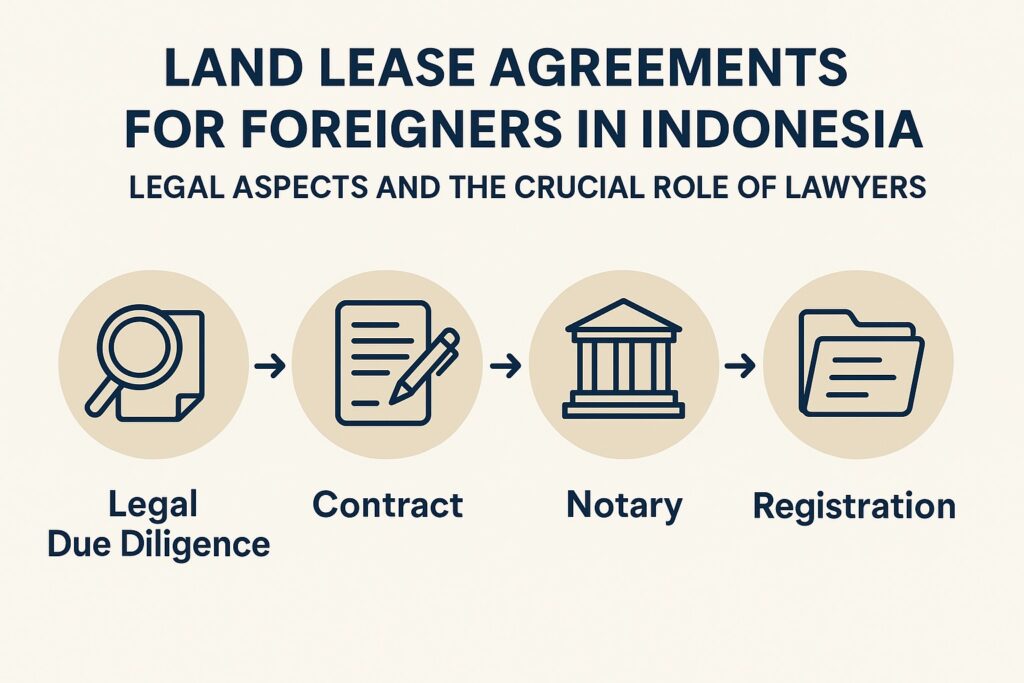Legal Aspects and the Crucial Role of Lawyers
Indonesia remains one of the most attractive destinations for foreign investors, expatriates, and entrepreneurs, particularly in the real estate and tourism sectors. However, one of the recurring questions from foreigners is: Can a foreigner lease land in Indonesia?
The short answer is yes. While Indonesian law strictly prohibits foreigners from owning freehold land (Hak Milik), they are legally allowed to lease or use land under certain conditions. In this context, land lease agreements become a vital instrument.
Yet, due to the complexity of Indonesian land law, the involvement of a qualified lawyer is indispensable to ensure that such agreements are not only legally valid but also protect the interests of both parties.
1. Legal Framework of Land Lease for Foreigners
The main regulations governing land rights in Indonesia include:
- The Indonesian Basic Agrarian Law (UUPA, Law No. 5 of 1960) – Article 42 recognizes that foreigners residing in Indonesia may obtain the right to use land (Hak Pakai).
- Civil Code (KUHPerdata), Article 1548 – Defines lease agreements as a contract where one party grants the right to use property for a certain period in exchange for payment.
- Government Regulation No. 103 of 2015 – Clarifies the residential property ownership rights of foreigners in Indonesia.
Under these laws, foreigners are not permitted to own land outright but may:
- Lease land directly from Indonesian individuals or entities.
- Acquire Hak Pakai (Right to Use) over state-owned land or land owned by Indonesian citizens.
- Enter into long-term lease agreements, which may last from 25 years and extendable up to 70 years, depending on the arrangement.
2. Common Risks in Foreign Land Lease Transactions
Despite the availability of legal mechanisms, many foreigners enter into problematic lease agreements due to poor drafting or reliance on informal arrangements. The most common risks include:
- Unclear Ownership Status
Land may be encumbered by mortgage, inheritance disputes, or overlapping certificates, exposing foreigners to future claims. - Improper Contract Drafting
Some contracts are made “under the table” without involving a notary, rendering them unenforceable in court. - Disguised Ownership Structures
In some cases, foreigners use nominee arrangements to control land indirectly, which is illegal and high-risk, as such agreements can be declared null and void. - Unspecified Rights and Obligations
Without clear provisions on renewal, termination, or compensation, the foreign lessee may lose significant investment upon lease expiry.
3. The Essential Role of Lawyers in Land Lease Agreements
Given the above risks, engaging a lawyer is not just optional but critical. The role of a legal professional includes:
- Legal Due Diligence – Verifying land certificates with the National Land Agency (BPN), checking zoning compliance, ensuring the land is free from disputes, and reviewing whether the lessor has the legal right to lease the land.
- Drafting and Reviewing Contracts – Ensuring that lease agreements are clear, enforceable, and compliant with Indonesian law. Key clauses usually include duration, payment terms, dispute resolution, force majeure, and renewal options.
- Negotiation Support – Protecting the client’s interest by negotiating balanced terms, avoiding one-sided provisions, and ensuring practical solutions for potential issues.
- Risk Mitigation – Adding arbitration clauses, indemnification, and exit strategies to reduce litigation risks.
- Transaction Assistance – Supporting notarization, registration, and recognition by relevant authorities.
4. Case Illustration
Consider a scenario where a foreign investor leases a plot of land in Bali to develop a boutique villa. Without legal due diligence, the investor later discovers that the land is under joint ownership with multiple heirs, some of whom never consented to the lease. As a result, the agreement is challenged in court, leading to financial loss and project delays.
Had the investor engaged a lawyer from the outset, the ownership issue could have been identified, and a legally secure agreement would have prevented such a dispute.
5. Practical Tips for Foreigners Considering a Land Lease
- Never sign a lease agreement without professional legal review.
- Ensure all agreements are executed before a notary and registered, not merely based on private documents.
- Avoid nominee arrangements, as they are not legally enforceable and may cause severe consequences.
- Check zoning and land-use permits to confirm that the land can be used for your intended purpose.
- Engage a bilingual contract, especially if the foreign party is not fluent in Bahasa Indonesia, to avoid misinterpretation.
Conclusion
For foreigners, leasing land in Indonesia can be a safe and profitable arrangement when done correctly. However, the complexities of Indonesian land law mean that entering into such agreements without proper legal guidance is highly risky.
The presence of a competent lawyer ensures that:
- The agreement complies with national regulations.
- The client’s investment and rights are legally protected.
- Potential disputes are minimized through well-drafted clauses.
In short, a land lease agreement without legal assistance is a gamble, while with a lawyer, it becomes a secure investment strategy.
If you are a foreign investor or an Indonesian landowner planning to enter into a lease arrangement, our legal team is ready to assist you. From conducting due diligence to drafting solid agreements, we ensure that your transaction is safe, transparent, and fully compliant with Indonesian law.
Contact us today for a consultation and safeguard your investment in Indonesia.

